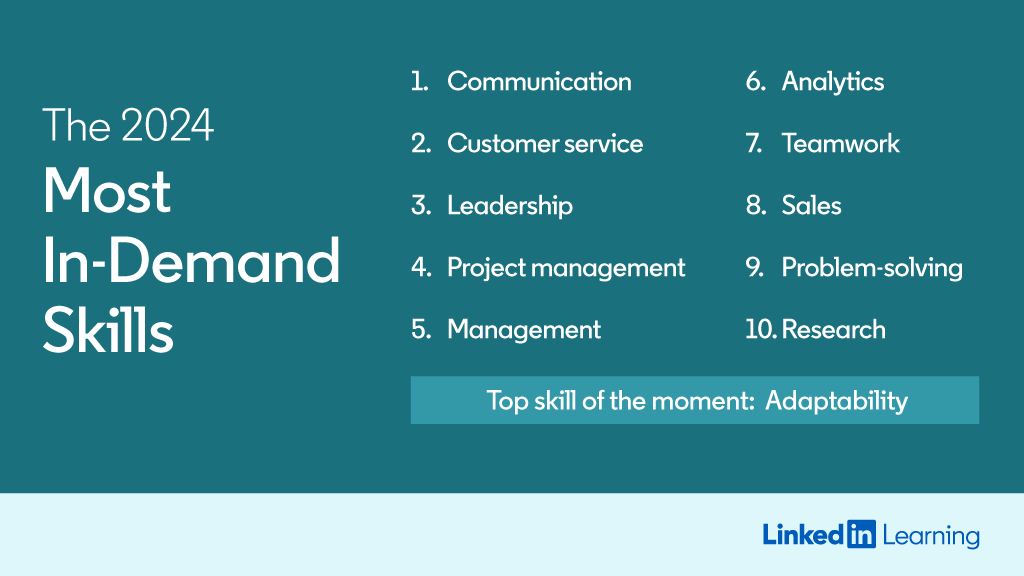A new report from LinkedIn identifies the critical skills professionals must develop to remain competitive in today’s workforce.
Communication, customer service, leadership, and adaptability top the list, reflecting a growing emphasis on uniquely human capabilities that AI can’t replicate.
“People skills are going to come more to the center of individual career growth,” predicts LinkedIn VP Aneesh Raman. “And people-to-people collaboration is going to come into the center more for company growth.”
The annual ranking is based on data from LinkedIn’s 1 billion users across 200 countries and regions.
The Top 10 Most In-Demand Skills For 2024
 Screenshot from: LinkedIn, April 2024.
Screenshot from: LinkedIn, April 2024.- Communication
- Customer Service
- Leadership
- Project Management
- Management
- Analytics
- Teamwork
- Sales
- Problem-Solving
- Research
In addition to the top 10 list, LinkedIn identified adaptability as the “skill of the moment” due to its remarkable year-over-year growth in demand.
“Since AI has changed work so profoundly over the last year, we’re highlighting adaptability as the top ‘skill of the moment’ with the biggest surge in demand,” said LinkedIn Global Head of Content Strategy Dan Brodnitz. “It’s indispensable for teams to keep steady and drive impact as the pace of change accelerates.”
By 2030, an estimated 65% of job skills are expected to change, up from just 25% in 2015. Currently, over half of LinkedIn users have roles at risk of disruption by AI.
To help people build critical soft skills, LinkedIn is offering free access to relevant learning courses until May 31st, 2024. Find links to each course in LinkedIn’s report.
The Importance Of Showcasing Skills On LinkedIn
According to a new LinkedIn blog post, as skills-based hiring becomes the norm, clearly listing your capabilities on your LinkedIn profile has never been more important.
“Increasingly, skills — as much as schooling, previous companies, job titles, and work experience — are what get you a new job,” writes LinkedIn’s Bruce M. Anderson.
Nearly half of hirers explicitly use members’ listed skills to fill open roles.
LinkedIn data shows that people with at least one listed skill receive up to double the number of profile views, connection requests, and messages compared to those without skills listed.
LinkedIn recommends listing up to 50 skills spanning hard technical and soft human skills.
Job seekers are advised to focus on skills frequently mentioned in job postings for their desired roles and sectors.
“God is in the details,” advises Anderson. “Where appropriate, list specific skills rather than generic skills or umbrella terms.”
For instance, instead of just “communication,” list public speaking, executive communications, copywriting, and other specialized communication skills.
However, more than simply listing skills is needed. LinkedIn recommends asking colleagues and managers for endorsements of listed skills.
Additionally, users can create a “Projects” section detailing how they applied particular skills and supporting claims with media like case studies, blog posts, and presentations.
“Regularly adding new skills is also advisable,” says Anderson, pointing to data showing members updated their skills 11% more frequently when hired or promoted.
In Summary
As AI automates more technical roles, clearly articulating one’s complete skills portfolio on LinkedIn has become a vital career currency. Those most adept at constantly updating their skills – and skillfully marketing them – will remain most employable in 2024 and beyond.
FAQ
How can adaptability enhance an SEO expert’s value in the face of AI advancements?
LinkedIn considers adaptability to be the most essential skill because the workplace is changing quickly due to advances in artificial intelligence (AI). For SEO professionals, adaptability means smoothly transitioning to using new technologies and dealing with search engine algorithm updates.
It involves flexibly shifting strategies when needed and staying competitive in the SEO industry.
As AI continues to transform job roles, SEO specialists who can rapidly learn and implement new techniques will continue to provide value to their clients and remain prominent and successful in the market.
In the context of SEO, what is the significance of continuously updating one’s skill set on professional platforms like LinkedIn?
Showing a broad and expanding set of abilities helps SEO experts better appeal to potential clients or employers, putting more emphasis on hiring people based on their specific skills.
Highlighting specialized SEO skills like technical website optimization and building high-quality backlinks, along with endorsements and examples of past projects, builds credibility. It proves you are dedicated to keeping up with the latest best practices in the ever-evolving SEO field.
Why should SEO experts focus on soft skills like leadership and teamwork, as LinkedIn indicates?
LinkedIn’s report shows a growing emphasis on soft skills, such as leadership and teamwork, which are difficult for AI to replicate.
For SEO experts, honing these skills is vital to successful project management, cross-functional collaborations, and leading SEO teams or initiatives.
Soft skills complement technical abilities, enabling SEO professionals to navigate client relationships and foster an environment of continuous improvement.

